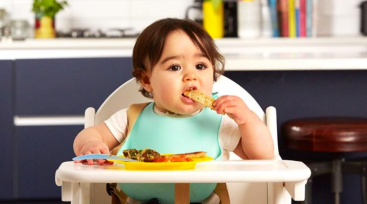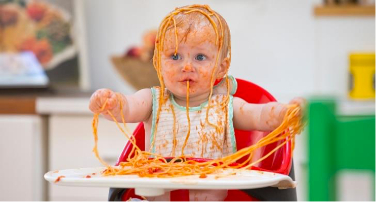By Registered Health Visitor – Julia Headland

The Department of Health recommends weaning from the age of 6 months because from that age, babies’ nutritional requirements change to meet their bodies’ growing demands and therefore the natural process of learning to eat solid food begins.
It is at this point, babies should be introduced to solid foods alongside their usual breast milk or infant formula milk. At this early stage, the food is complimentary to milk and teaches them how to move food around their mouth, chew, and swallow solid foods.
As time progresses and your baby becomes fully weaned, their milk has more of a complimentary role to their diet. For their first year, it is important to ensure that your baby is taking about 500-600 mls of formula (or breast milk equivalent) alongside their diet as until your baby is 12 months old, breast or formula milk should continue to provide a significant proportion of your baby’s energy requirements.
NB: All babies are different, and some babies may be ready to wean slightly earlier, however you should not start the process of weaning earlier than 17 weeks because babies’ kidneys and digestive systems, along with their motor skills, are not developed sufficiently to cope with solid foods and it can also increase the risk of infections and allergies. Equally, you should not start weaning their baby later than 26 weeks as it may lead to the baby struggling with lumpier foods later.
Tell-tale signs that your baby is ready to wean…
- Staying in a sitting position and able to hold their head steady
- Co-ordinating hands and mouth so that they can look at food, pick it up and put it in their mouths themselves
- Swallowing food
Starting Out
Weaning is a fantastic opportunity for the family to sit down together and share a meal and for the baby to learn from their parents or siblings.
It can be a very slow process initially so try not start with extremely high expectations of your baby as this may cause you to become worried and frustrated.
The first aim is to get your baby used to the feeling of food and the different tastes in his or her mouth and this may take a little while! It is important to try and offer a wide variety of tastes to help educate their palates and to help them to become good eaters in future.
We would always advise starting the weaning process with vegetables which will teach your baby that not all foods are sweet, and it can increase their liking for vegetables in the future. Remember too that if a baby spits out a new taste at first, parents should keep trying as the more times a baby tries a new taste, the more likely they are to accept it (even if it takes a few attempts!)
Foods to Avoid During Weaning
Cow’s Milk – this can be used in cooking from 6 months onwards, but it does not contain the right nutrients to replace breast or formula milk as your baby’s main drink until at least after their first birthday.
Goat’s Milk – like cow’s milk, this lacks the right balance of nutrients to replace breast or formula milk as a baby’s main milk drink. However, provided it is pasteurised, it can be used in cooking from 6 months old.
Added Salt – babies’ kidneys are not developed enough to cope with much sodium so do not add salt to babies’ food, this also includes using gravy and stock cubes as these are both quite high in salt.
Added Sugar – excessive consumption of sugar can damage your baby’s teeth and encourage them to develop a sweet tooth. Sugar also has very little nutritional value and contributes nothing to a balanced diet, so it is best avoided if possible. However, natural sugars from mashed fruit, breast/ formula milk are fine.
Honey– avoid honey until after the age of 12 months. Bacteria in honey can occasionally produce toxins in a baby’s intestines and cause infant botulism which is a very serious illness. Honey is also very high in sugar and contribute to teeth decay.
Whole Nuts – because they create a choking hazard, whole nuts should not be consumed in children under the age of five. If there is no family history of allergy, they can be given in cooking from 6-months onwards.
Low-fat foods – babies need fat in their diets and should not be given low fat milks, yogurts, or low-fat adult foods. It is better for children between the ages of 6 months and 2 years to have full-fat milk, yogurts, and cheese.
Shark, Swordfish and Marlin – these types of fish can contain harmful levels of mercury which could affect your baby’s developing nervous system.
Raw Shellfish – your baby’s immune system is less developed than an adult’s and this makes them more susceptible to food poisoning. Raw shellfish should be avoided but cooked shellfish is fine for babies over 6 months old.
Mould Ripened Soft Cheese or Unpasteurised Cheese – because your baby’s immune system is still developing, they are more susceptible to illness from bacteria in foods than adults are. Unpasteurised cheeses and soft mould ripened versions such as brei or camembert are not suitable for a baby’s digestive system.
Tea or Coffee – any drink that contains caffeine is unsuitable for a baby and the tannins in the tea may interfere with the absorption of Iron.
Undercooked Eggs without the Red Lion Stamp – babies over 6 months can have eggs and if they have the red lion stamp, they can be given raw (eg, in homemade mayonnaise) or lightly cooked. If they do not have this stamp or the words “British Lion Quality,” then they should be cooked through until both the yolk and white are solid.
The Process of Spoon-fed Weaning
| Baby’s Age | Skills Babies are Naturally Learning | Texture of Food |
| From 6 months | Taking food from a spoon.Moving food from the front to the back of the mouth for swallowing. | Smooth purees of fruit and vegetables, progressing to soft mashed foods |
| 7-9 months | Moving lumps of food around the mouth and chewing.Using fingers to feed themselves.Sipping drinks from a cup. | Mashed food with soft lumps. Soft finger foods, eg, cooked vegetables and soft peeled fruits |
| 10-12 months | Chewing minced and chopped food.Trying to use a spoon to feed themselves. | Harder finger foods eg, toast, biscuits, and harder vegetables. Minced and chopped, tailored family meals. |

Top Tips for Starting Weaning
Choose a time of day when they are relaxed, and baby is alert.
Try giving the baby food during or after a milk feed so that the baby is not hungry and does not get frustrated when expecting breast or bottle feed.
To begin with, offer a couple of teaspoons of food once a day. Try starting with pureed vegetables then progress to fruit or cereal mixed with milk.
Allow plenty of time and prepare to get messy!
Wait for your baby to open their mouth before spoon feeding. if your baby does not seem to like a particular food, do not force it, just try again another day.
Gradually increase the amount of food and offer food twice and then three times a day. the aim will eventually be to get babies eating three meals a day- breakfast, lunch, and dinner with healthy snacks in between.
Once your baby has learned to eat pureed foods, start giving food with soft lumps. Even babies without teeth can learn to chew soft lumps.
Let your baby learn and get used to individual tastes before mixing fruits (in particular, fruits and vegetables) Remember to keep introducing the baby to a wide range of healthy tastes and textures by trying new foods- this way they are more likely to keep eating them as they grow up. It can take ten or more attempts before a baby accepts a new food so keep trying.
Be positive and praise your baby for trying new foods.
Batch Cooking and Storage Guidelines
Healthy homemade food can get babies used to the type of food that your whole family eats which will certainly make life easier form you and so making up batches of food and freezing them will help for those busy day.
When preparing foods for the freezer, it is important to cool the food down before you freeze it.
Food stored in the fridge should be used within 2 days and food stored in the freezer should be consumed within 3 months.
Foods should be thoroughly reheated (only once) to ensure that it is piping hot all the way through and then left to cool before feeding the baby.
———End———
For those people I have not yet met, my name is Julia Headland and I am a registered health visitor and registered general nurse with a degree in public health and over 20 years of experience. I am very pleased to work alongside the Norfolk House Nursery team.
You can arrange to meet me for confidential advice or guidance about your child’s health or development; during the pandemic these consultations are being conducted by Zoom or telephone.
My consultations are free of charge and they are confidential.
You can book an appointment with me via the Norfolk House Nursery staff.
You can also follow me on Facebook if you wish:
